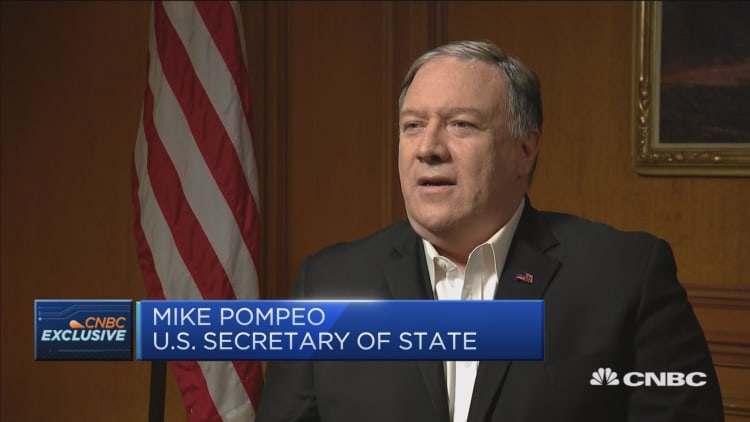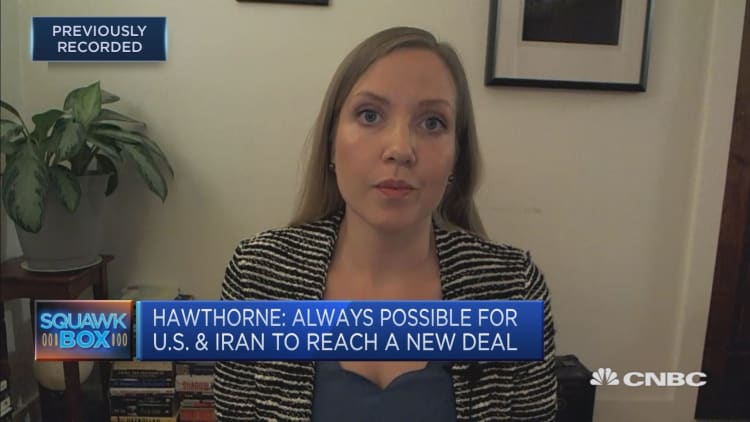DUBAI — Oil prices rose sharply Tuesday morning on reports of a drone attack at oil pumping stations in Saudi Arabia.
The incident is an "act of terrorism," Saudi Energy Minister Khalid al-Falih said according to the Saudi state news agency SPA, describing attacks on two oil pumping stations near Riyadh for the country's East-West pipeline carried out with bomb-laden drones.
Brent crude futures were up 1.7% at $71.39 a barrel. U.S. West Texas Intermediate (WTI) crude futures settled at $61.86 per barrel, up 1.2%.
The fire has since been contained, according to the SPA. Al-Falih asserted that oil production was not interrupted. State oil company Saudi Aramco said that its oil and gas supplies to Europe have not been affected, and that no one was injured.
"This act of terrorism and sabotage in addition to recent acts in the Arabian Gulf do not only target the Kingdom but also the security of world oil supplies and the global economy," the SPA described al-Falih as saying.
No one has yet been directly accused of carrying out the attack, but a Yemeni Houthi-run TV channel announced on Tuesday morning it had launched drone attacks on several Saudi installations.
The channel Masirah TV, citing a Houthi military official, reported that "seven drones carried out attacks on vital Saudi installations."
Al-Falih, according to the SPA statement, said: "These attacks prove again that it is important for us to face terrorist entities, including the Houthi militias in Yemen that are backed by Iran."
Yemen's Houthi rebels, who are supported by Iran, have been fighting Saudi Arabia in their country since the kingdom launched an offensive against it in early 2015 in defense of its internationally-recognized government, which the Houthis had overthrown. The more than four-year long conflict has been deemed by the UN as the world's worst humanitarian crisis.
'Sabotage attacks' and tensions with Iran
Saudi Arabia's main stock index, the Tadawul, was down 3.8%.
The exchange, which joined the MSCI emerging markets index this year as part of the country's economic diversification agenda, dropped 2.7% on Monday on government reports that two Saudi oil tankers were among four vessels targeted in an unspecified "sabotage attack" off the United Arab Emirates coast of Fujeirah.

Fears over potential for accidental conflict
The series of incidents have ramped up tensions in the oil-rich region, where the reported sabotage attack on the commercial vessels Sunday has spiked fears of possible conflict with regional rival Iran. The escalation could threaten the Strait of Hormuz, a critical choke point for some 30% of the world's seaborne oil.
The news also follows a week of increasingly provocative language exchanged between Washington and Tehran.
Citing "very real" threats coming from Iran, but withholding specific details, Secretary of State Mike Pompeo emphasized during an interview with CNBC on Sunday that all options — military and otherwise — were on the table in case Iran "makes a bad decision."

Tehran announced last week that it would return to higher levels of uranium enrichment, breaching the 2015 Iranian nuclear deal, if Europe did not protect it from the impact of U.S. sanctions, which have crippled Iran's economy.
This followed the White House pushing news of a U.S. strike group carrier in the Gulf to send an "unmistakable" message to Iran. Although the ship was on a routine deployment, the administration's announcement signaled its preparedness for confrontation.
With the growing volume of military hardware occupying the Persian Gulf, analysts and foreign officials fear a miscalculation or misunderstanding could spark a serious conflict.
British Foreign Minister Jeremy Hunt told reporters on Monday: "We are very worried about the risk of a conflict happening by accident with an escalation that is unintended."


